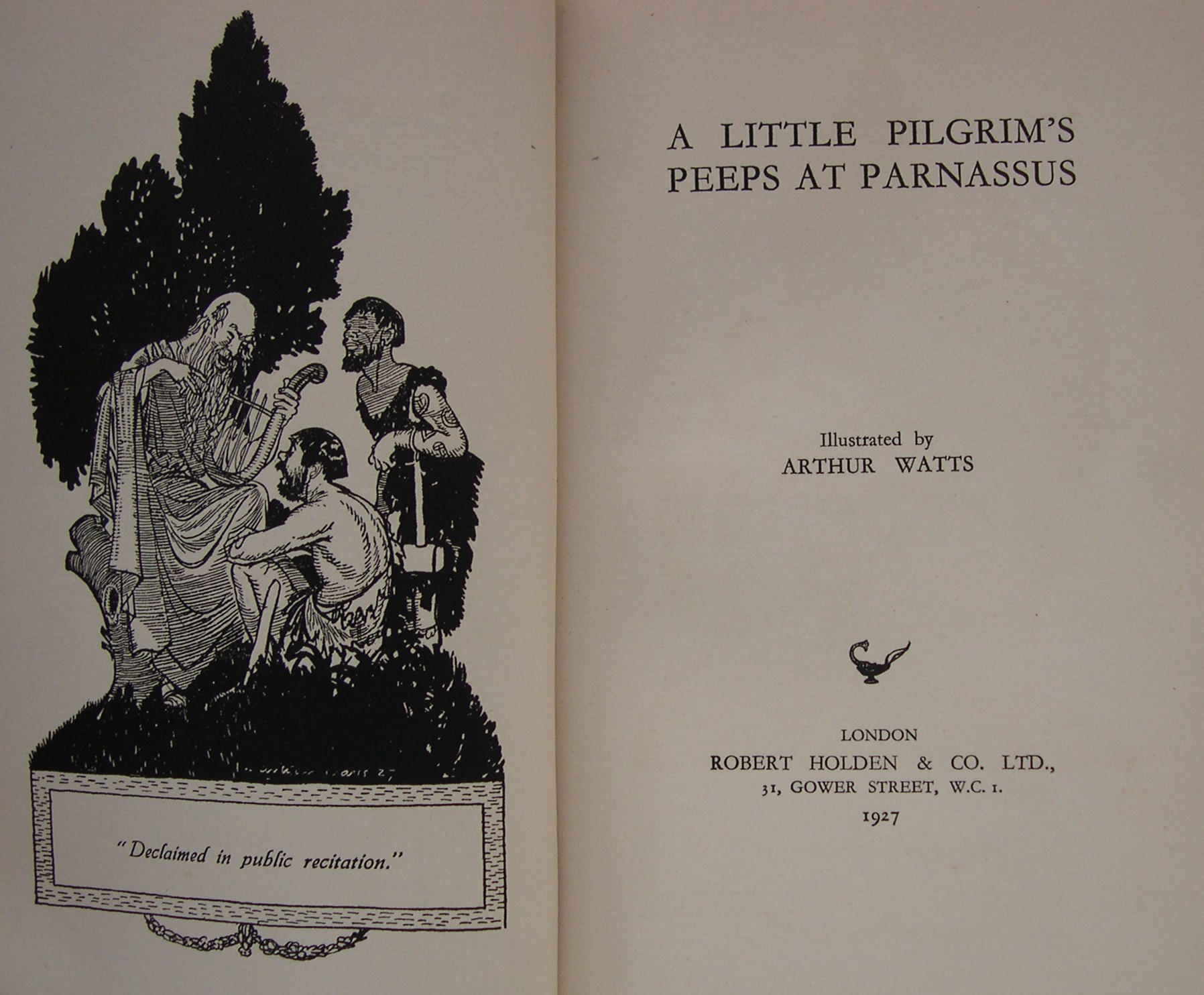A Little Pilgrim’s Peeps at Parnassus first drew my attention because of its awkward title, then because of the brilliant illustrations by Arthur Watts. A few peeps of my own showed that it seemed to be a children’s book, teaching the history of British literature through the ages in rhyming couplets. I thought I’d get it and give it a go.
As I read the piece, I started to question my assumptions. It’s rhyming hexameters, especially those with the forced rhymes - seemed comic, inflated, maybe even hudibrastic. What’s more the piece was incredibly opinionated, though the didactic nature of some older children’s books tends that way, it seemed to be pushed to comic extremes. The book also expected the reader to be pretty knowledgeable about English history and literature, with its references to Praisegod Barebones and minor Elizabethan writers. Again though, many earlier children’s books did expect quite a lot of (what is now) specialist knowledge from its readers. I had to look it up.
Had my copy of this book retained its dust-jacket, I’d have discovered the author of the book, Olga Katzin and the full title; Peeps at Parnasus: A Delicious Survey, Half Parody, Half Caricature, of the Whole Pageant of English Verse-Malicious and Gay. Rather than a strange, opinionated children’s book, it’s a strange opinionated adult book masquerading as a children’s one.
Starting with the druids, singing their native British songs of praise before being cruelly slaughtered by Romans, the book posits a ‘British Muse’ that is sometimes made at home on her island of birth and sometimes chased away by other things (often, those pesky foreign influences - though the story of the beginning of the book is essentially about how English emerged from all those pesky foreign influences).
After the druids were the Anglo-Saxons with their “mile on alliterative mile”, followed by Danes, and the Normans. At this point England was open to ‘anyone who ruled the waves’ so William thought he’d give it a go, even despite the firm English reply of “Really William” and “Enough”. As a result, the muse chose not to spend time with the Norman language and instead;
“dived into the melting pot
where English speech was being made-
…
She spent her subterranean time
In making reason mate with rhyme.”
Until Chaucer came along. Then a bunch of people who tried to sound like Chaucer, and then new, exciting people like Spenser, Lyly and Herrick. Interestingly, Shakespeare is not named in this book. He’s alluded to and the Mermaid Tavern is mentioned but the story as told in this book is of a shining, over-the-top time that is then clamped down by puritans like the aforementioned Barebones and by Milton. Before being punctured by the noble knight Hudibras.
Then we get into the eighteenth century and “The little, mighty Alexander” who is a “galaxy of wits in one” who ruled “arbitrarily” with such smile and bite that even the muse grows scared of him.
“None wing with such accomplished Craft
The polished Couplet’s lethal Shaft
In flights of dazzling Coruscation
As if expressly for Quotation.”
Pope is followed by the Scriblerans, other poets and then, horror of horrors - Grub Street! Those filthy unlettered beggars who write for money, trash the Muse and sell her on street corners.
“The greedy and abandoned trollop
Don’t even put her parasol-up.” (Which is a pretty good example of some of the rhymes in this piece… luckily, she has a hero.
“Her providential rescuer
The doating Lexicographer
A rock of adamantine stuff
A mountain in a cloud of snuff,
Withdraws her from her venal ease
To Virtue and the Cheshire Cheese.” (Which is 3 minutes walk from where I’m writing this in Gough Square).
After Johnson has saved the Muse (and marked Goldsmith’s homework) we run onto Thompson, Ossian, Chatterton, a visit to some graveyard poets and onto Burns.
So the book goes on for another hundred pages, getting more detailed and more obscure until it reaches the writer’s time of 1927. It charts poetry’s superstar years with the romantics, its decline under the tyranny of Dickens and the age of the novel. The part about The Great War and the war poets is surprisingly touching, yet also makes the point that if there hadn’t have been a war, they’d have been writing airy nonsense about flowers.
Amongst the highlights of the later parts of the book are a friendly welcome to “chubby Mr Lear”, a poet who could be easily missed in a survey such as this. Yeats gets describes as “more surely sidhe-like than the sidhe” and T.S Elliot is described as, “serving putrid forage/ from intellectual cold storage”.
I’d have probably appreciated the book more had I been more of a poetry person, a barb stings rather less if you don’t know who it is aimed at but I enjoyed this book for its bad attitude and daft rhymes.



No comments:
Post a Comment